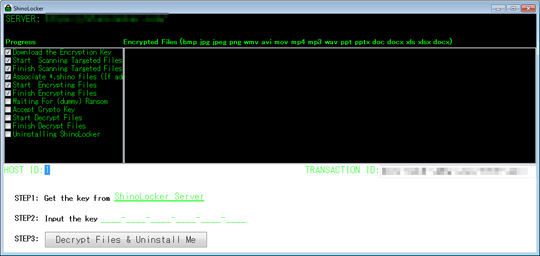RANSOM_SHINOLOCK.A
Windows


Threat Type: Trojan
Destructiveness: No
Encrypted: No
In the wild: Yes
OVERVIEW
This Trojan arrives on a system as a file dropped by other malware or as a file downloaded unknowingly by users when visiting malicious sites. It may be manually installed by a user.
It gathers information and reports it to its servers.
TECHNICAL DETAILS
Arrival Details
This Trojan arrives on a system as a file dropped by other malware or as a file downloaded unknowingly by users when visiting malicious sites.
It may be manually installed by a user.
Installation
This Trojan drops a copy of itself in the following folders using different file names:
- %User Temp%\{random filename1}.exe
(Note: %User Temp% is the user's temporary folder, where it usually is C:\Documents and Settings\{user name}\Local Settings\Temp on Windows 2000, Windows Server 2003, and Windows XP (32- and 64-bit); C:\Users\{user name}\AppData\Local\Temp on Windows Vista (32- and 64-bit), Windows 7 (32- and 64-bit), Windows 8 (32- and 64-bit), Windows 8.1 (32- and 64-bit), Windows Server 2008, and Windows Server 2012.)
Other System Modifications
This Trojan adds the following registry keys:
HKEY_CURRENT_USER\Software\ShinoLocker
HKEY_LOCAL_MACHINE\SOFTWARE\Classes\
.shino
HKEY_LOCAL_MACHINE\SOFTWARE\Classes\
ShinoLockerEncryptedFile
HKEY_CURRENT_USER\Software\Microsoft\
Windows\CurrentVersion\Explorer\
BitBucket\c
It adds the following registry entries:
HKEY_CURRENT_USER\Software\ShinoLocker
P = "%User Temp%\{random filename1}.exe"
HKEY_CURRENT_USER\Software\ShinoLocker
PS = "%User Temp%\{random filename2}.exe"
HKEY_CURRENT_USER\Software\ShinoLocker
FL = "C:\Users\dyituser_732\AppData\Local\Temp\{random filename 4}.lst"
HKEY_CURRENT_USER\Software\ShinoLocker
TF = "C:\Users\dyituser_732\AppData\Local\Temp\{random filename 3}.txt"
HKEY_CURRENT_USER\Software\ShinoLocker
TD = "{string}"
HKEY_CURRENT_USER\Software\ShinoLocker
H = "1"
HKEY_CURRENT_USER\Software\ShinoLocker
V = "{B64 string}"
HKEY_CURRENT_USER\Software\Microsoft\
Windows\CurrentVersion\Explorer\
BitBucket\c
NeedToPurge = "1"
HKEY_LOCAL_MACHINE\SOFTWARE\Classes\
.shino
HKEY_LOCAL_MACHINE\SOFTWARE\Classes\
ShinoLockerEncryptedFile\shell\open\
command
HKEY_LOCAL_MACHINE\SOFTWARE\Classes\
ShinoLockerEncryptedFile\DefaultIcon
HKEY_LOCAL_MACHINE\SOFTWARE\Microsoft\
Windows\CurrentVersion\Explorer
GlobalAssocChangedCounter = "24"
Dropping Routine
This Trojan drops the following files:
- %User Temp%\{random filename2}.exe-AES Encryptor/Decryptor
- {random filename 3}.txt.shino-Contains encrypted string
- {random filename 4}.lst-Contains the list of encrypted files
(Note: %User Temp% is the user's temporary folder, where it usually is C:\Documents and Settings\{user name}\Local Settings\Temp on Windows 2000, Windows Server 2003, and Windows XP (32- and 64-bit); C:\Users\{user name}\AppData\Local\Temp on Windows Vista (32- and 64-bit), Windows 7 (32- and 64-bit), Windows 8 (32- and 64-bit), Windows 8.1 (32- and 64-bit), Windows Server 2008, and Windows Server 2012.)
Other Details
This Trojan encrypts files with the following extensions:
- .bmp
- .jpg
- .jpeg
- .png
- .wmv
- .avi
- .mov
- .mp4
- .mp3
- .wav
- .pptx
- .doc
- .docx
- .xls
- .xlsx
- .doc
It renames encrypted files using the following names:
- {filename of encrypted files}.shino
It gathers the following information and reports it to its servers:
- https://{BLOCKED}ocker.com
NOTES:
This ransomware only encrypts files in the following folders:
- %Desktop%
- %Desktop%\{subfolders}
It has the following capabilities:
- Restore encrypted files
- Uninstall self
It displays the following user interface upon execution:

It replaces the encrypted files' icon with the malware's icon.
SOLUTION
Step 1
Before doing any scans, Windows XP, Windows Vista, and Windows 7 users must disable System Restore to allow full scanning of their computers.
Step 2
Note that not all files, folders, and registry keys and entries are installed on your computer during this malware's/spyware's/grayware's execution. This may be due to incomplete installation or other operating system conditions. If you do not find the same files/folders/registry information, please proceed to the next step.
Step 3
Identify and terminate files detected as RANSOM_SHINOLOCK.A
- Windows Task Manager may not display all running processes. In this case, please use a third-party process viewer, preferably Process Explorer, to terminate the malware/grayware/spyware file. You may download the said tool here.
- If the detected file is displayed in either Windows Task Manager or Process Explorer but you cannot delete it, restart your computer in safe mode. To do this, refer to this link for the complete steps.
- If the detected file is not displayed in either Windows Task Manager or Process Explorer, continue doing the next steps.
Step 4
Delete this registry key
Important: Editing the Windows Registry incorrectly can lead to irreversible system malfunction. Please do this step only if you know how or you can ask assistance from your system administrator. Else, check this Microsoft article first before modifying your computer's registry.
- In HKEY_CURRENT_USER\Software\ShinoLocker
- HKEY_LOCAL_MACHINE\SOFTWARE\Classes\.shino
- HKEY_LOCAL_MACHINE\SOFTWARE\Classes\.shino
- In HKEY_LOCAL_MACHINE\SOFTWARE\Classes\ShinoLockerEncryptedFile
- HKEY_CURRENT_USER\Software\Microsoft\Windows\CurrentVersion\Explorer\BitBucket\c
- HKEY_CURRENT_USER\Software\Microsoft\Windows\CurrentVersion\Explorer\BitBucket\c
Step 5
Search and delete this file
- %User Temp%\{random filename2}.exe
- {random filename 3}.txt.shino
- {random filename 4}.lst
Step 6
Scan your computer with your Trend Micro product to delete files detected as RANSOM_SHINOLOCK.A. If the detected files have already been cleaned, deleted, or quarantined by your Trend Micro product, no further step is required. You may opt to simply delete the quarantined files. Please check this Knowledge Base page for more information.
Did this description help? Tell us how we did.


